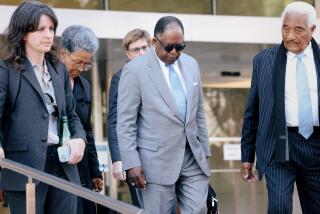22 of 42 Charges Against Keating Are Set Aside
- Share via
A Los Angeles Superior Court judge Friday set aside more than half of the state fraud charges filed against former thrift owner Charles H. Keating Jr. and three co-defendants because they were too vague or failed to show a violation of law.
The ruling on 22 counts of the 42-count indictment was a blow to prosecutors. Judge Lance A. Ito gave them until Nov. 19 to file an amended indictment against the former top executives at the failed Lincoln Savings & Loan in Irvine and its parent company.
Keating said in a telephone conversation from Phoenix that he was “elated” over the judge’s ruling. “We’ve said all along that we didn’t do anything illegal,” he said.
However, it is unclear what impact the ruling will have on the overall case against Keating.
The 22 counts covered by Friday’s action involve alleged violations of state business laws. The other 20 charges allege the defendants sold bonds to Lincoln depositors by deception and omission of material facts. “I find there is rational basis in the grand jury transcripts” to support those 20 counts, Ito said.
In his ruling, Ito invoked a rarely used 1872 law that allows prosecutors to make changes in an indictment without reconvening a grand jury. Once the charges are revised, Ito can accept them or formally dismiss those counts. Reconvening a state grand jury would be cumbersome and costly.
Los Angeles County Deputy Dist. Atty. William Hodgman, who acknowledged in court that the indictment was poorly worded, said later he would rewrite the document, adding more charges and making it “bulletproof.”
Defense attorneys contended that the case should be dismissed outright. They argued that any changes in the indictment should be made by the grand jury.
“We have a right to be held accountable only for what the grand jury had in mind,” not what prosecutors think the grand jury intended, said Keating’s attorney, Stephen C. Neal.
For small investors in Keating’s American Continental Corp., the Phoenix firm that owned Lincoln, the courtroom setback was dismaying. Many of them were elderly Lincoln depositors who lost their life savings in the collapse of Keating’s empire.
“I’m terribly disappointed. It’s very discouraging and a horrible thing to have happen,” said Jack C. Lower, a Riverside County resident who heads a group of investors holding about $500,000 in bonds.
Bondholder Harold Rosenberg of Sherman Oaks, however, did not think Ito’s ruling was a severe blow. “I don’t think Mr. Keating is going to walk away,” he said.
Keating, former chairman of American Continental, along with former holding company President Judy J. Wischer, and former Lincoln presidents Ray C. Fidel and Robin S. Symes were indicted in September in the first criminal case since the collapse of Lincoln.
They are charged with violating state securities laws in the sale of more than $200 million in American Continental bonds at Lincoln’s 29 Southern California branches.
If convicted, each could receive a maximum prison term of 10 years.
Small investors have contended they were misled into believing the bonds were safe or insured. The bonds have become worthless since the company filed for bankruptcy protection in April, 1989, and federal regulators seized Lincoln the next day. The company is being liquidated and regulators have put Lincoln up for sale.
Regulators estimate that Lincoln will cost taxpayers more than $2 billion, making it one of the most expensive thrift failures.
Nationwide, the collapse of hundreds of S&Ls; is expected to cost taxpayers more than $500 billion over 30 years, or about $2,000 for every citizen.
Keating, who engineered the acquisition and fast growth of the thrift through risky investments, has emerged as a nationwide symbol of what went wrong with the nation’s savings and loan industry.
He remains unbowed. Referring to his way of operating Lincoln, he said, “I think I’m the solution, not the cause.”
The pressure on prosecutors nationwide to hold thrift executives accountable for the industry debacle was a big reason for the “sloppy” indictment against Keating and the others, said Abbe David Lowell, Wischer’s attorney.
Defense attorneys contended that they could not tell from the indictment, exhibits and nearly 4,600 pages of grand jury transcripts exactly what Keating and the others allegedly did wrong. They conceded that the testimony of 89 witnesses contained much that might be illegal, but the indictment does not say what parts of the testimony would be used to back up the charges.
Judge Ito said 20 of the 22 counts he set aside simply do not state an offense. Those counts allege that the defendants sold bonds in ways that exceeded the authority given them by state Department of Corporations, which approved the bond sales.
The law under which they are charged, however, states only that it is against the law to sell bonds without getting that authority. Since they had the authority, the judge reasoned, that law could not apply.
Deputy Dist. Atty. Paul Turley, who helped present the case to the grand jury, said prosecutors will change the wording to state simply that the defendants sold the bonds without proper authority.
Ito found that the other two charges--accusing the defendants of lying to the Corporations Department and failing to clear advertising with the agency--did not give Keating and the others specific explanation of what they did wrong.
The judge noted, for example, that he did not know which advertisements were at issue in the indictment.
In his ruling Friday, Ito relied on a state law that allows a district attorney to make minor amendments to an indictment even after the grand jury has been disbanded.
As long as the changes are minor, the prosecutor need not submit them to a grand jury.
However, if the amendments are considered major--that is, if they “change the offense charged”--the district attorney must submit the proposed changes “to the same or another grand jury.”
UC Berkeley law professor Phillip E. Johnson on Friday said the law seemed “perfectly sensible” to him. He said rules requiring that the same grand jury that brought an indictment make even minor changes to it would waste a lot of time.
Defense attorneys contend, though, that the changes are not minor. It will be up to Judge Ito to determine whether the revisions by prosecutors are satisfactory.
Keating is a target of a wide-ranging federal grand jury investigation that has been probing the collapse of his empire. He also faces a $1.1-billion civil racketeering lawsuit filed a year ago by federal regulators.
Regulators also are seeking $40 million in restitution from Keating in three Lincoln deals. And about 23,000 bondholders and other investors in American Continental also have sued him and his executives, as well as the lawyers and accountants who advised them.
Times staff writers James Bates and Ted Rohrlich contributed to this report.
More to Read
Sign up for Essential California
The most important California stories and recommendations in your inbox every morning.
You may occasionally receive promotional content from the Los Angeles Times.













